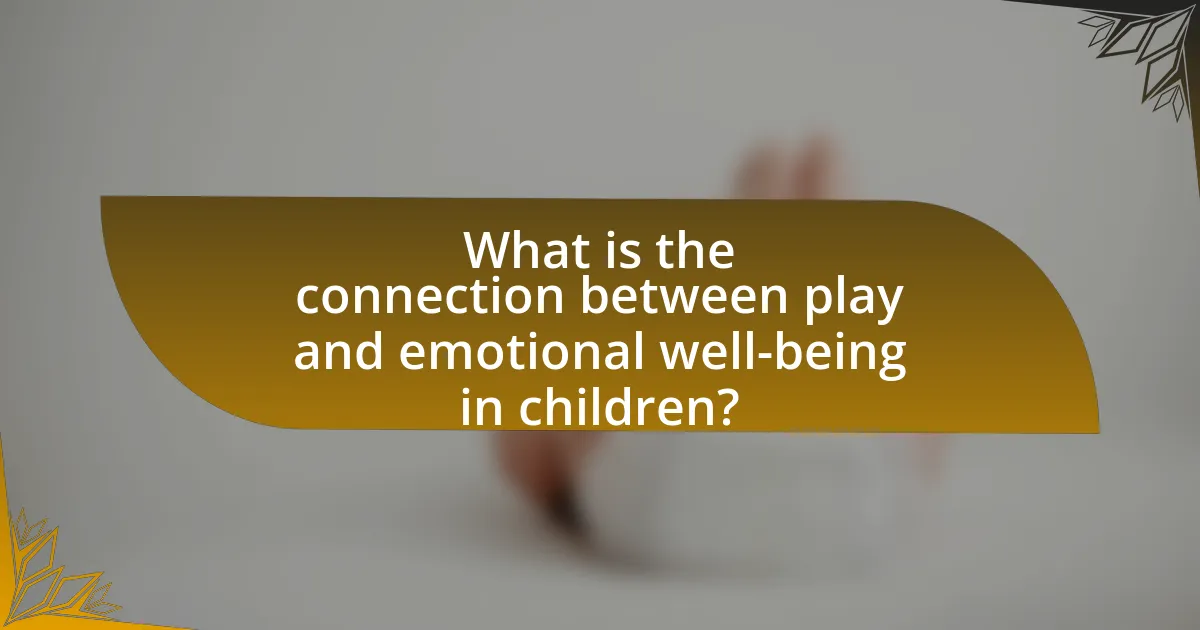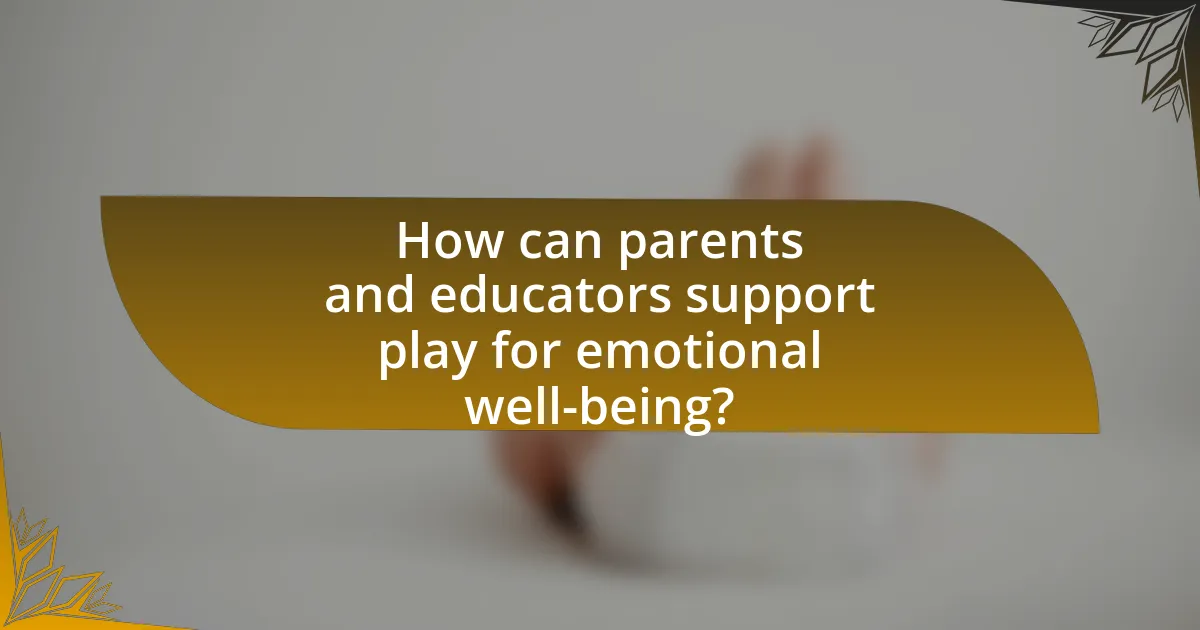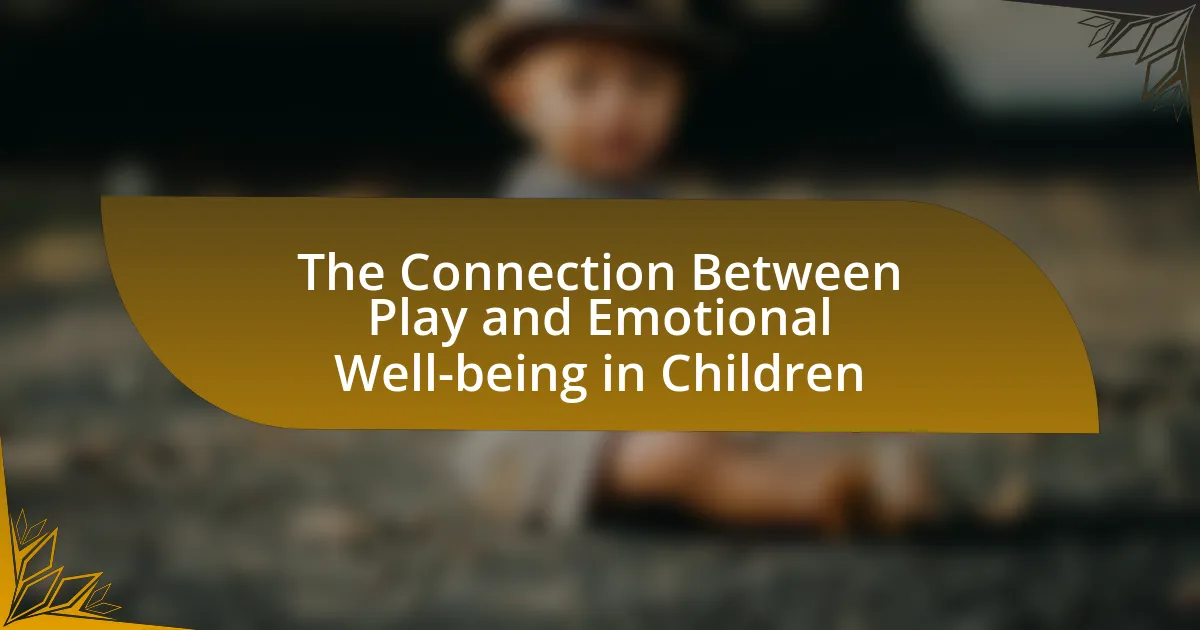The article examines the critical connection between play and emotional well-being in children, highlighting how various forms of play contribute to emotional regulation, social skills, and resilience. It discusses the influence of imaginative, physical, social, and constructive play on emotional development, supported by research indicating that regular play reduces anxiety and fosters emotional intelligence. Additionally, the article addresses the long-term benefits of play on emotional health, the challenges in promoting play, and practical strategies for parents and educators to enhance play opportunities for children, ultimately emphasizing the importance of play in supporting children’s mental health and emotional resilience.

What is the connection between play and emotional well-being in children?
Play is fundamentally connected to emotional well-being in children, as it fosters social skills, emotional regulation, and resilience. Engaging in play allows children to express their feelings, explore their environment, and develop coping mechanisms for stress. Research indicates that children who participate in regular play exhibit lower levels of anxiety and depression, highlighting the importance of play in promoting mental health. A study published in the journal “Child Development” by author David L. Smith found that play enhances emotional intelligence, enabling children to better understand and manage their emotions. This evidence underscores the critical role of play in supporting the emotional development of children.
How does play influence emotional development in children?
Play significantly influences emotional development in children by providing opportunities for expression, social interaction, and problem-solving. Engaging in play allows children to explore their feelings, learn to manage emotions, and develop empathy through role-playing and cooperative games. Research indicates that children who participate in play-based activities exhibit better emotional regulation and social skills. For instance, a study published in the journal “Child Development” found that children who engage in imaginative play demonstrate increased emotional understanding and resilience, highlighting the critical role of play in fostering emotional well-being.
What are the different types of play that contribute to emotional well-being?
Different types of play that contribute to emotional well-being include imaginative play, physical play, social play, and constructive play. Imaginative play allows children to express emotions and explore different scenarios, fostering creativity and emotional understanding. Physical play, such as running or climbing, helps release pent-up energy and reduces stress, promoting overall mental health. Social play encourages interaction with peers, enhancing social skills and emotional intelligence through shared experiences. Constructive play, involving building or creating, boosts problem-solving skills and provides a sense of accomplishment, which is vital for self-esteem. Research indicates that these types of play are essential for developing resilience and coping mechanisms in children, ultimately supporting their emotional well-being.
How does imaginative play affect children’s emotional health?
Imaginative play significantly enhances children’s emotional health by allowing them to express feelings, develop empathy, and cope with stress. Engaging in role-playing scenarios helps children process their emotions and experiences, fostering emotional resilience. Research indicates that children who participate in imaginative play exhibit improved social skills and emotional regulation, as they learn to navigate complex social interactions and understand different perspectives. A study published in the journal “Child Development” by researchers Sara Meadows and David L. Smith found that imaginative play is linked to higher levels of emotional intelligence, demonstrating its critical role in emotional development.
Why is play considered essential for emotional regulation?
Play is considered essential for emotional regulation because it provides children with a safe space to express and process their emotions. Engaging in play allows children to explore different scenarios, practice coping strategies, and develop social skills, which are crucial for managing their feelings. Research indicates that play facilitates emotional development by enabling children to simulate real-life situations, thereby helping them understand and navigate their emotions more effectively. For instance, a study published in the journal “Child Development” by Ginsburg (2007) highlights that play contributes to emotional resilience by allowing children to confront fears and practice problem-solving in a low-stakes environment.
What role does play have in helping children cope with stress?
Play serves as a crucial mechanism for helping children cope with stress by providing them with a safe space to express emotions and process experiences. Engaging in play allows children to explore their feelings, practice problem-solving, and develop coping strategies in a low-pressure environment. Research indicates that play can reduce cortisol levels, a hormone associated with stress, thereby promoting emotional regulation and resilience. For instance, a study published in the journal “Child Development” found that children who engage in imaginative play demonstrate better emotional understanding and coping skills, which are essential for managing stress effectively.
How does social play enhance emotional intelligence in children?
Social play enhances emotional intelligence in children by providing opportunities for them to practice and develop key emotional skills such as empathy, self-regulation, and social awareness. During social play, children interact with peers, which requires them to recognize and respond to the emotions of others, fostering empathy. Research indicates that children who engage in cooperative play are better at understanding social cues and managing their own emotions, as they learn to navigate conflicts and negotiate roles within play scenarios. A study published in the journal “Child Development” by Brown and Dunn (2010) found that children who frequently participated in social play exhibited higher levels of emotional understanding and better emotional regulation compared to those who engaged in solitary play. This evidence supports the conclusion that social play is crucial for the development of emotional intelligence in children.
What are the long-term effects of play on emotional well-being?
The long-term effects of play on emotional well-being include enhanced emotional regulation, improved social skills, and increased resilience. Engaging in play allows children to express their emotions, practice problem-solving, and develop coping strategies, which contribute to their overall emotional health. Research indicates that children who participate in regular play exhibit lower levels of anxiety and depression as they grow older. A study published in the journal “Child Development” by researchers at the University of California found that play fosters social competence and emotional intelligence, leading to better relationships and mental health outcomes in adulthood.
How does early play experience shape future emotional resilience?
Early play experience significantly shapes future emotional resilience by fostering essential skills such as problem-solving, social interaction, and emotional regulation. Engaging in play allows children to navigate challenges, learn to cope with failure, and develop empathy through interactions with peers. Research indicates that children who participate in diverse play activities exhibit greater adaptability and emotional strength later in life. For instance, a study published in the journal “Child Development” by Ginsburg (2007) highlights that play promotes cognitive and emotional development, which are critical components of resilience. Thus, early play experiences lay the groundwork for robust emotional health and resilience in adulthood.
What evidence supports the link between play and emotional outcomes?
Research indicates that play significantly influences emotional outcomes in children. For instance, a study published in the journal “Child Development” by Ginsburg (2007) highlights that play fosters emotional regulation, social skills, and resilience. Additionally, a meta-analysis conducted by Pellegrini and Gustafson (2005) found that children who engage in play exhibit lower levels of anxiety and improved mood. These findings collectively demonstrate that play serves as a critical mechanism for enhancing emotional well-being in children.

How can parents and educators support play for emotional well-being?
Parents and educators can support play for emotional well-being by providing safe, engaging environments that encourage free play and creativity. Research indicates that unstructured play allows children to express emotions, develop social skills, and enhance problem-solving abilities. For instance, a study published in the journal “Child Development” by Ginsburg (2007) highlights that play fosters resilience and coping mechanisms in children, which are crucial for emotional health. By facilitating opportunities for play, such as outdoor activities, creative arts, and cooperative games, parents and educators can significantly contribute to children’s emotional development and overall well-being.
What strategies can parents use to encourage play?
Parents can encourage play by providing a variety of play materials and opportunities that stimulate creativity and engagement. For instance, offering open-ended toys, such as building blocks or art supplies, allows children to explore their imagination and develop problem-solving skills. Research indicates that children who engage in diverse play experiences demonstrate improved emotional regulation and social skills, which are crucial for their overall well-being. Additionally, setting aside dedicated time for unstructured play each day fosters a routine that prioritizes play, reinforcing its importance in a child’s development.
How can parents create a safe environment for play?
Parents can create a safe environment for play by ensuring that the play area is free from hazards and age-appropriate. This includes removing sharp objects, securing heavy furniture, and using soft surfaces like grass or mats to cushion falls. Research indicates that children are less likely to experience injuries in well-maintained play areas, which supports their emotional well-being by allowing them to explore freely without fear of harm. Additionally, supervision during playtime enhances safety and fosters a sense of security, further contributing to positive emotional development.
What types of activities promote emotional well-being through play?
Activities that promote emotional well-being through play include imaginative play, physical play, and cooperative games. Imaginative play, such as role-playing or storytelling, allows children to express their feelings and explore different perspectives, which enhances emotional understanding. Physical play, like sports or outdoor activities, releases endorphins, reducing stress and improving mood. Cooperative games foster teamwork and social skills, helping children build relationships and develop empathy. Research indicates that these types of play contribute significantly to emotional resilience and overall mental health in children, as highlighted in studies by the American Academy of Pediatrics, which emphasize the importance of play in childhood development.
How can educators incorporate play into the curriculum?
Educators can incorporate play into the curriculum by integrating structured play activities that align with learning objectives. For instance, using role-playing scenarios in subjects like history can enhance engagement and understanding, as demonstrated by research from the University of Cambridge, which found that play-based learning improves cognitive and social skills in children. Additionally, incorporating games that promote teamwork and problem-solving can foster emotional well-being, as studies indicate that play reduces stress and anxiety in children, contributing to a positive learning environment.
What are the benefits of play-based learning in schools?
Play-based learning in schools enhances children’s emotional well-being by fostering social skills, creativity, and problem-solving abilities. This approach allows children to engage in activities that promote collaboration and communication, which are essential for developing interpersonal relationships. Research indicates that children who participate in play-based learning demonstrate improved emotional regulation and resilience, as they learn to navigate challenges and express their feelings in a supportive environment. A study published in the journal “Early Childhood Research Quarterly” found that play-based learning significantly contributes to children’s social-emotional development, highlighting its effectiveness in creating a positive learning atmosphere.
How can teachers facilitate social play among students?
Teachers can facilitate social play among students by creating structured opportunities for interaction through group activities and play-based learning. By organizing cooperative games and collaborative projects, teachers encourage students to engage with one another, fostering communication and teamwork skills. Research indicates that structured play enhances social skills and emotional well-being, as it allows children to practice conflict resolution and empathy in a safe environment. For instance, a study published in the Journal of Educational Psychology found that children who participated in guided play showed improved social interactions and emotional regulation compared to those who did not.

What challenges exist in promoting play for emotional well-being?
Promoting play for emotional well-being faces several challenges, including societal perceptions, resource allocation, and accessibility. Societal perceptions often undervalue play as a legitimate form of emotional support, leading to insufficient advocacy for its importance. Resource allocation can be limited, as funding for play programs is frequently overshadowed by academic and performance-based initiatives, resulting in fewer opportunities for children to engage in play. Additionally, accessibility issues arise when play spaces are not available in all communities, particularly in low-income areas, which restricts children’s ability to benefit from play as a means of emotional expression and development. These challenges hinder the effective promotion of play as a crucial component of emotional well-being in children.
What barriers do children face in accessing play opportunities?
Children face several barriers in accessing play opportunities, including lack of safe spaces, socioeconomic constraints, and limited parental support. Safe spaces for play, such as parks and playgrounds, are often inadequate or unavailable in low-income neighborhoods, which restricts children’s ability to engage in outdoor activities. Socioeconomic constraints can limit access to resources like toys, organized sports, or community programs that facilitate play. Additionally, limited parental support, often due to work commitments or lack of awareness about the importance of play, can further hinder children’s opportunities to play. Research indicates that these barriers can negatively impact children’s emotional well-being, as play is essential for developing social skills and coping mechanisms.
How do societal changes impact children’s playtime?
Societal changes significantly impact children’s playtime by altering the environments and opportunities available for play. For instance, urbanization has led to reduced access to safe outdoor spaces, limiting children’s ability to engage in free play. According to a study published in the journal “Childhood,” children in urban areas often have less access to parks and recreational facilities, which directly affects their physical activity levels and social interactions. Additionally, the rise of digital technology has shifted play from physical activities to screen-based interactions, influencing the nature of socialization and imaginative play. Research from the American Academy of Pediatrics indicates that excessive screen time can lead to decreased physical activity and hinder emotional development, further illustrating how societal trends shape children’s play experiences.
What role does technology play in children’s play experiences?
Technology significantly enhances children’s play experiences by providing interactive and immersive environments that foster creativity and learning. Digital games and applications often encourage problem-solving skills, collaboration, and social interaction among peers. For instance, a study published in the journal “Computers & Education” by researchers from the University of California found that children who engaged with educational technology showed improved cognitive skills and increased motivation to learn. This integration of technology into play not only supports emotional well-being by allowing children to express themselves but also helps them develop essential skills for the future.
How can communities support play initiatives for emotional health?
Communities can support play initiatives for emotional health by creating accessible play spaces and organizing community events that promote play. Accessible parks and playgrounds encourage children to engage in physical activity, which has been shown to reduce stress and improve mood. For instance, a study published in the Journal of Environmental Psychology found that children who play outdoors exhibit lower levels of anxiety and higher levels of happiness. Additionally, community organizations can host structured play programs that foster social interaction, helping children develop emotional resilience. Research from the American Academy of Pediatrics indicates that play is essential for emotional development, as it allows children to express feelings and cope with challenges. By prioritizing these initiatives, communities can significantly enhance the emotional well-being of children.
What programs exist to promote play in underserved areas?
Programs that promote play in underserved areas include the Playworks program, which focuses on improving recess and play opportunities in schools, and KaBOOM!, which builds playgrounds in communities lacking safe play spaces. Playworks has been implemented in over 3,000 schools across the United States, positively impacting more than 1.2 million children by fostering inclusive play environments. KaBOOM! has constructed over 17,000 playgrounds, serving millions of children in low-income neighborhoods, thereby addressing the lack of recreational facilities. These programs are essential in enhancing children’s emotional well-being through structured play and social interaction.
How can community spaces be designed to encourage play?
Community spaces can be designed to encourage play by incorporating diverse play structures, natural elements, and flexible layouts that cater to various age groups and abilities. Research indicates that environments with varied play equipment, such as climbing structures, swings, and interactive installations, promote physical activity and social interaction among children, which are essential for emotional well-being. Additionally, integrating natural features like trees, gardens, and water elements can enhance sensory experiences and foster imaginative play, as supported by studies showing that nature-based play areas contribute positively to children’s mental health. Furthermore, creating open spaces that allow for unstructured play encourages creativity and social skills, aligning with findings from the American Academy of Pediatrics that emphasize the importance of play in child development.
What practical tips can enhance the connection between play and emotional well-being?
Engaging in unstructured play enhances emotional well-being by allowing children to express themselves freely and develop social skills. Encouraging regular outdoor play can significantly improve mood and reduce anxiety, as studies show that physical activity releases endorphins, which are natural mood lifters. Additionally, incorporating imaginative play fosters creativity and problem-solving abilities, contributing to a child’s resilience and emotional intelligence. Providing a safe environment for play, where children can explore and take risks, further supports their emotional development by building confidence and reducing fear of failure.
How can parents balance structured and unstructured playtime?
Parents can balance structured and unstructured playtime by allocating specific time slots for each type of play while ensuring that both forms are integrated into their child’s daily routine. Structured play, such as organized sports or educational activities, provides children with skill development and social interaction, while unstructured play, like free play or imaginative games, fosters creativity and emotional expression. Research indicates that children benefit from a mix of both types of play; for instance, a study published in the journal “Child Development” found that children who engage in both structured and unstructured play exhibit better emotional regulation and social skills. By intentionally scheduling time for both play types, parents can support their child’s overall emotional well-being and development.
What resources are available for promoting play in children?
Resources available for promoting play in children include educational materials, community programs, and online platforms. Educational materials such as books and guides provide parents and educators with strategies to encourage play-based learning. Community programs, like local parks and recreation activities, offer structured play opportunities that foster social interaction and physical activity. Online platforms, including websites and apps, provide interactive games and resources that promote creative play. Research indicates that engaging in play enhances emotional well-being, as it supports cognitive development and social skills, which are crucial for children’s overall health.
